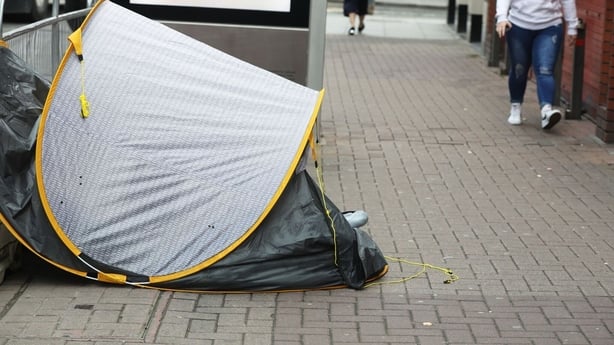A charity which provides food, internet and washing facilities to rough sleepers said it has encountered 46 International Protection (IP) applicants in the last month using its day services.
In December, the Department of Integration announced that it was not in a position to provide a bed to all IP applicants due to a severe shortage in emergency accommodation.
Since then, the number of male asylum seekers told they must find their own accommodation has been rising.
The latest figures released on Tuesday show that 500 male International Protection applicants arrived in Ireland since 4 December.
Of those, 124 were offered accommodation while 376 were not.
Those 376 people have been provided with an extra €75 a week on top of their daily expense allowance of €38.50.
In the last month, the Mendicity Institution has catered for 94 new presentations from people looking to use their rough sleeping services. Of those, 46 are people who have come to Ireland to apply for asylum.
Among them was a man from South Africa who arrived in Ireland three weeks ago.
Speaking to RTÉ's Morning Ireland, he said that he was told at the International Protection Office that he was not eligible for accommodation.
"I don't want to take anything from women and children and at that point they said, 'well, it's up to you. You're gonna have to go on the streets until we can find accommodation.'
"I was given an email, which you can email constantly to find out if there is any accommodation available. But every time I email them, they say I am on the chart. I am waiting but nothing," he said.

The man said he got a tent and two sleeping bags from the Capuchin Day Centre and spent three nights sleeping rough.
"Initially I I did panic because there was no way I was going to sleep in town. That's why I went to the peninsula. I found an area where I was isolated. I saw neither tents, neither people. And then I felt all right."
He then met someone at Mendicity who told him about a bed at a small shelter run by the Missionaries of Charity and said he has been treated well there ever since and is very grateful.
Another recent arrival to Ireland who uses Mendicity is a 27-year old man who had fled the Democratic Republic of the Congo. He said he walks the streets at night and sleeps for a few hours in bus shelters.
Another man at Mendicity, who is from Somalia, said the weekly €75 provided by the State on top of the €38.50 is not enough to cover accommodation costs in Dublin. As a result, he sleeps most nights in a tent.
Mendicity CEO Louisa Santora said that in the last month there have been 94 new clients at the service and 46 are International Protection applicants.
She said: "We've had a number of telephone queries and email queries from people who maybe have misunderstood that we could possibly provide them with accommodation, so it's up to us then to explain that no, we're not an accommodation provider that these are the services that we can offer and these are the supports that we can offer."
Ms Santora said that people are sleeping in a variety of places, such as 24-hour fast-food restaurants or petrol stations or are walking the streets at night, searching for somewhere to shelter.
She said there is a freephone number for people who are sleeping rough which is provided by the Dublin Regional Homeless Executive, but asylum seekers cannot avail of any of their emergency beds.
In a statement, the DRHE said: "DRHE does not have a role in the provision of accommodation to International Protection applicants. That falls under the remit of the Department of Children, Equality, Disability, Integration, Youth.
"International Protection applicants are provided with the relevant contact details to access supports, should they contact our services or be encountered sleeping rough. The Dublin Outreach team does not provide tents to any rough sleepers but will provide sleeping bags to those they meet that are bedded down."
A spokesperson for the Department of Integration said that Ireland is currently accommodating more than 100,160 people between those fleeing Ukraine and IP applicants.
They said that despite "intensive efforts" to source emergency accommodation, the department cannot provide accommodation to all IP applicants "due to the severe shortage".
The spokesperson added that the department is working to bring more bed spaces into use and all IP applicants who present to the International Protection Office are assessed for "significant vulnerabilities and health issues, and prioritised for accommodation as necessary".
They continued: "In addition to the increased expense payment day services are provided to those who wish to avail of them. In such centres IP applicants can access facilities including hot showers, meals and laundry services seven days a week.
"The department also liaises and coordinates efforts with relevant stakeholders - government departments, charities, NGOs, and An Garda Síochána - to ensure that the most vulnerable applicants continue to be identified and provided with accommodation. With these measures the Department are working towards limiting the number of international protection applicants who are 'rough sleeping'."






